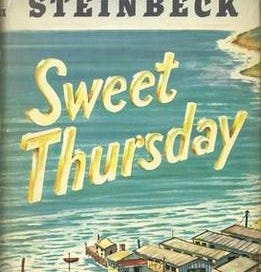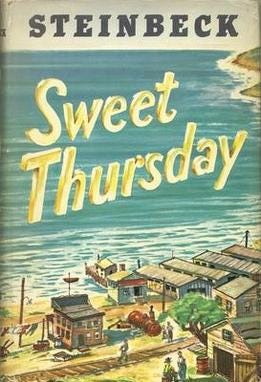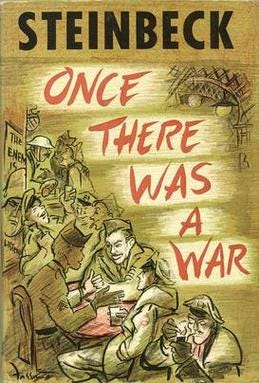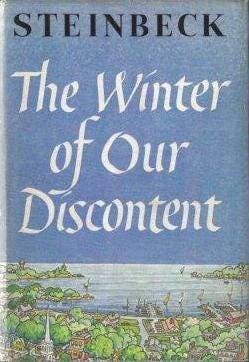The Steinbeck Review #8 - The Remnants of Glory
Sweet Thursday | The Short Reign of Pippin IV | Once There Was a War | The Winter of Our Discontent
Exploring Life and Literature
Dear Friends,
In our journey through all of Steinbeck’s works this year, we are coming to the end of his career and his life. The four books showcased this month are lesser-known works, written in the twilight of his life and published after his glory days. While he remained consistent in his themes and style, he branched out and tried new things. During this period, he was generally considered to be more settled and content which has led some critics to believe the lack of conflict resulted in works of less renown.
“Men do change, and change comes like a little wind that ruffles the curtains at dawn, and it comes like the stealthy perfume of wildflowers hidden in the grass.”
― John Steinbeck, Sweet Thursday
Sweet Thursday, published in 1954, is a sequel to his earlier novel Cannery Row. It is written in Steinbeck's characteristic style and fits neatly into his body of work. Steinbeck focused on tight-knit communities, portraying their struggles, camaraderie, and shared humanity. In this novel, the community is the quirky inhabitants of Cannery Row in Monterey, California.
While Steinbeck is known for his serious social criticism, Sweet Thursday stands out for its lighter, more humorous tone. This reflects Steinbeck's more optimistic side while maintaining the depth of character development and social observation typical of his work. The story's focus is Doc, a marine biologist, and his relationships with the other characters. Steinbeck's empathy for his characters shines through as he uses them to explore deeper social issues.
Readers and critics gave the novel a positive reception, though it isn't one of Steinbeck's most significant works. Some appreciated its warmth and humor, especially following the heavier tone of The Grapes of Wrath and East of Eden. However, others felt it lacked the gravitas of his more famous novels. Over time, it has become beloved by fans of Steinbeck for its charming portrayal of life on Cannery Row.
At its core, Sweet Thursday is a love story about Doc's relationship with Suzy, a new arrival in town. Love, personal growth, and redemption take center stage as the characters navigate their own flaws and past mistakes. The novel explores the importance of community and how individuals find belonging within it. The characters are a makeshift family, supporting each other despite their differences and hardships.
This novel reflects on the post-World War II era, with changes in society and the environment of Cannery Row. Steinbeck examines how characters adapt to these changes, often with resilience and humor. While Sweet Thursday is a more lighthearted novel, it still embodies many of the serious elements that made him famous.
“The one thing our species is helpless against is good fortune. It first puzzles, then frightens, then angers, and finally destroys us.” ― John Steinbeck, The Short Reign of Pippin IV
The Short Reign of Pippin IV is a satirical novel by John Steinbeck that departs from his usual style. Unlike his more famous works, which often deal with serious social issues and focus on realism, this novel humorously critiques the absurdities of political life, specifically in France. While he has used humor before, this novel is more overtly comedic and farcical, showcasing a lighter side of his writing.
Even though the tone differs, Steinbeck's focus on social commentary remains intact. The novel critiques political systems, bureaucracy, and the absurdity of power, reflecting his ongoing interest in critiquing societal structures. Steinbeck’s talent for creating memorable characters is present, though the characters are more exaggerated and caricatured in this case than in his other works. Pippin, a man thrust unexpectedly into kingship, is portrayed with a mix of bewilderment and reluctant acceptance, showing Steinbeck's ability to infuse characters with humanity even in a comedic setting.
The Short Reign of Pippin IV initially received mixed reviews. Steinbeck's shift to satire surprised critics and readers; many felt it was a minor work compared to his more serious novels. Some appreciated the novel's wit and humor, while others found it less engaging than his more impactful stories. Over time, it has remained less known, less studied, and a curious outlier in his work.
The novel ponders the arbitrary nature of political power as Pippin, an ordinary man, is suddenly crowned king of France. Steinbeck uses this premise to satirize the absurdities of governance and the fickleness of public opinion. Pippin's unexpected rise to power forces him to grapple with questions of identity and responsibility which allows Steinbeck to examine how individuals respond to roles and expectations imposed on them by society. The novel also reflects Steinbeck’s skepticism of political and social institutions. It suggests that beneath the surface of these institutions lies a fundamental absurdity, which Steinbeck exposes through humor.
The Short Reign of Pippin IV diverges from Steinbeck's typical style with its farcical tone yet addresses themes of power, identity, and societal critique. It remains an unconventional but interesting part of Steinbeck's literary legacy.
“There are times in war when the sharpest emotion is not fear, but loneliness and littleness.” ― John Steinbeck, Once There Was a War
Once There Was a War, published in 1958, is a collection of his war correspondence from World War II, originally written for the New York Herald Tribune. The book departs from Steinbeck's fictional narratives but aligns with his overarching themes.
Readers knew Steinbeck for his ability to capture the human experience. In this collection, he applies these strengths to nonfiction, offering a vivid, unembellished portrayal of war as he witnessed it. His emphasis on the everyday experiences of soldiers reflects his interest in the lives of ordinary people. The correspondence is marked by Steinbeck's empathy for the soldiers and civilians caught in the conflict. His writing goes beyond mere reporting; it humanizes the war, focusing on personal stories and the emotional realities of those involved. His keen eye for detail, often seen in his descriptive prose in novels, is evident in his war reporting. He brings the same observational skills to his descriptions of life on the front lines, precisely capturing the atmosphere, tension, and moments of calm.
Once There Was a War was well-received for its candid and poignant wartime observations. The book was praised for its clear, unpretentious prose and focus on the human side of the conflict, which provided a different perspective from the more propagandistic or sensationalized war reporting of the time.
One of the book's central themes is the human cost of war. Steinbeck focuses on the individual soldiers—their fears, hopes, and the camaraderie that sustains them. This focus on the personal, rather than the political or strategic, aspects of war is a characteristic of Steinbeck’s empathetic storytelling. While the letters are serious in tone, Steinbeck also captures the ironies of war. His writing reflects a recognition of the surreal and often contradictory nature of life during wartime, echoing the subtle irony that can be found in some of his other works. Steinbeck often wrote about characters who endure hardship with dignity and perseverance, and this is evident in his portrayal of soldiers coping with the realities of war. This book was appreciated for its insight and humanity, although it is often overshadowed by his more famous fictional works.
“You know how advice is - you only want it if it agrees with what you wanted to do anyways.” ― John Steinbeck, The Winter of Our Discontent
The Winter of Our Discontent, published in 1961, is Steinbeck's last novel published during his life. It marks a return to the moral and social criticism themes that characterized his earlier work while representing a more introspective and somber phase of his writing.
Steinbeck was known to explore the moral choices facing individuals and society. This novel delves deeply into integrity, corruption, and the moral decay of American culture. The protagonist, Ethan Hawley, is a man of principles who struggles with the temptation to abandon his ethics for wealth and social status, moral dilemmas faced by characters in Steinbeck’s earlier works. The novel critiques the post-war American Dream, focusing on how materialism and the pursuit of success have led to moral and ethical decline. This perspective on American culture aligns with Steinbeck's broader focus on social issues.
Ethan Hawley is typical of Steinbeck's complex, flawed characters. The novel is a psychological study of a man in crisis, struggling with identity, values, and place in a changing world. This character-driven approach affords Steinbeck the opportunity to show how the internal conflicts of individuals often mirror larger societal issues.
The book received mixed reviews upon release. Some critics praised it for its depth and moral seriousness, seeing it as a return to the powerful social commentary of Steinbeck's earlier work. However, others found it overly moralistic or felt it lacked emotional impact. Despite the mixed critical reception, the novel was influential enough to be cited when Steinbeck received the Nobel Prize in Literature in 1962.
The novel centers on the struggle between maintaining moral integrity and succumbing to corruption. Ethan Hawley's internal conflict drives the narrative as he grapples with whether to compromise his values for personal gain. Steinbeck critiques the American Dream, questioning the idea that success is measured solely by wealth and social standing. The novel explores the consequences of a society prioritizing material success over ethical behavior, and Steinbeck examines how the pressures of modern life and losing traditional values can lead to a sense of disconnection and despair. Ethan’s decisions ultimately affect his family, relationships, and sense of self, allowing us to see that every choice has consequences for the individual and those around them.
Beyond the Bookshelf is a reader-supported publication. If you have the means and desire, please consider upgrading to a paid subscription.
Until next time,
Previous articles in this series:
If you are a new subscriber or missed any of the previous articles in this series, you can catch up at the link below:
All opinions in this essay are my own. Any biographical or factual information was obtained through the references below:
Mad at the World: A Life of John Steinbeck by William Souder
John Steinbeck: A Biography by Jay Parini
John Steinbeck, Writer: A Biography by Jackson Benson
Steinbeck: A Life in Letters edited by Elaine Steinbeck and Robert Wallsten











Thank you for this enlightening summary. It has encouraged me to return to Steinbeck whose works were some of the most influential in my late teens and early adult life.
I missed the novel and was introduced to Pippin IV via the stage - it seemed to be one of a number of satirical political writings that were in vogue at the time. I've read Steinbeck's collected work as a journalist both from WW2 and his later work from Vietnam. There have been suggestions that he at times may have 'colored outside the lines' in his accounts so it may be best not to take every single word as the literal truth but I actually saved one of his stories about a night spent in the company of his fellow war correspondents - and I believe every single word of that story.